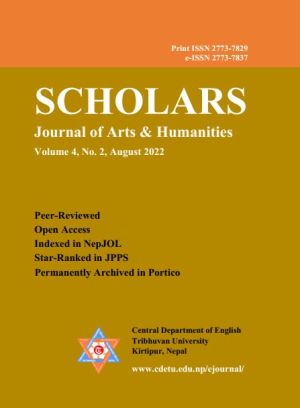The Interface between Environmental Hostility and Human Perversity in Bapsi Sidhwa’s The Pakistani Bride
DOI:
https://doi.org/10.3126/sjah.v4i2.47424Keywords:
Ecocriticism, ecosystems, porous boundary, tropical world, perversity, hostile environmentAbstract
Ecocriticism is popularly thought of as a unidirectional exercise for preserving nature in its pristine and uncontaminated form. This view is grossly reductive because ecosystems are many, not one, local and not global. The natural green world is not always necessarily friendly to human aspirations. In fact, ‘green’ is the colour of falsehood, unreliability and deception in medieval English literature. The colonial medical discourses also endorse this diversity of the natural world. In these discourses, the tropical world of the European colonies is described as a ‘diseased world’ in contrast to the sanitized temperate world of the west. Since the boundary between humans and the environment is porous, human nature is perverted in environments hostile to human habitation. Bapsi Sidhwa’s The Pakistani Bride documents the interrelationship between the arid, bleak and closed world of mountains in Kohistan and the perversity of the isolated pockets of feuding tribes that inhabited it. It foregrounds that it is impossible to improve human nature if we simply surrender to uncontrollable natural forces and abandon all efforts to ameliorate our living conditions. It is, therefore, essential to realize that ecocriticism is not merely concerned with the protection of pristine external nature. It is an effort to reframe our interactions with nature not as mastery but as negotiation. If human-made changes have endangered the life-supporting systems of the world, we should instead, as Rachel Carson urges, explore what alternatives are available to us.
Downloads
Downloads
Published
How to Cite
Issue
Section
License
Copyright (c) 2022 Central Department of English, Tribhuvan University and Authors

This work is licensed under a Creative Commons Attribution 4.0 International License.
© Central Department of English, Tribhuvan University and Authors




